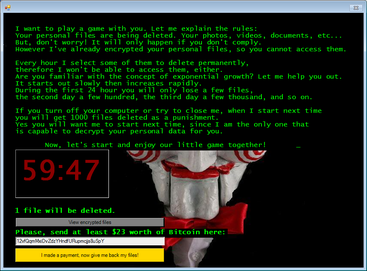Pennsylvania county shells out a $500K ransom to recover stolen data
Delaware County says election data remains securely tucked way on a separate network


Last week, hackers stole data from Delaware County, Pennsylvania and asked for a $500,000 ransom. New reports claim the county has buckled and will use its insurance coverage to pay the fee and restore the data.
The cyber attack led to the county taking parts of its network offline when it discovered the compromise.
"The County of Delaware recently discovered a disruption to portions of its computer network. We commenced an immediate investigation that included taking certain systems offline and working with computer forensic specialists to determine the nature and scope of the event. We are working diligently to restore the functionality of our systems," said the county.
The county added that the Bureau of Elections and the County's Emergency Services Department were not impacted and were on separate computer networks from The County of Delaware.
“There is no evidence they were impacted by the disruption,” it added. “The County is working to resolve this issue as quickly as possible and will provide updates when they are available. Thank you for your patience as we work to restore the functionality of our systems.”
It is thought that the IP address for the Delaware County attack is tied to the Netherlands, but the attack could have originated elsewhere.
Chad Anderson, senior security researcher at DomainTools, told IT Pro that ransomware authors have increasingly gone after the double extortion attacks for the simple reason that this further encourages their victims to pay.
Sign up today and you will receive a free copy of our Future Focus 2025 report - the leading guidance on AI, cybersecurity and other IT challenges as per 700+ senior executives
“When sitting on a treasure trove of sensitive personal information, attackers know that the looming threat of exposing it on hacking forums gives them more leverage to instigate a payment. This all comes of course with an increasing number of businesses paying, further incentivizing attackers to use this extra leverage,” he said.
Anderson added that governmental bodies and public entities are particularly attractive targets for cyber-crime gangs and nation-state actors because of the financially lucrative or politically sensitive information they hold.
“Government minsters, civil servants and anyone else involved in the process of government need to be especially vigilant to phishing emails – which remain the most popular entry vector for ransomware - and the security measures in place need to be the most stringent available, including user training on the risks and tell-tale signs of a phishing attack and email filtration systems,” said Anderson.
Rene Millman is a freelance writer and broadcaster who covers cybersecurity, AI, IoT, and the cloud. He also works as a contributing analyst at GigaOm and has previously worked as an analyst for Gartner covering the infrastructure market. He has made numerous television appearances to give his views and expertise on technology trends and companies that affect and shape our lives. You can follow Rene Millman on Twitter.
-
 Hackers are using LLMs to generate malicious JavaScript in real time – and they’re going after web browsers
Hackers are using LLMs to generate malicious JavaScript in real time – and they’re going after web browsersNews Defenders advised to use runtime behavioral analysis to detect and block malicious activity at the point of execution, directly within the browser
-
 AI coding is taking off in the US - but developers in another country are “catching up fast”
AI coding is taking off in the US - but developers in another country are “catching up fast”News Developers in the United States are leading the world in AI coding practices, at least for now
-
 Everything we know so far about the Nike data breach
Everything we know so far about the Nike data breachNews Hackers behind the WorldLeaks ransomware group claim to have accessed sensitive corporate data
-
 There’s a dangerous new ransomware variant on the block – and cyber experts warn it’s flying under the radar
There’s a dangerous new ransomware variant on the block – and cyber experts warn it’s flying under the radarNews The new DeadLock ransomware family is taking off in the wild, researchers warn
-
 Hacker offering US engineering firm data online after alleged breach
Hacker offering US engineering firm data online after alleged breachNews Data relating to Tampa Electric Company, Duke Energy Florida, and American Electric Power was allegedly stolen
-
 Cybersecurity experts face 20 years in prison following ransomware campaign
Cybersecurity experts face 20 years in prison following ransomware campaignTwo men used their tech expertise to carry out ALPHV BlackCat ransomware attacks
-
 15-year-old revealed as key player in Scattered LAPSUS$ Hunters
15-year-old revealed as key player in Scattered LAPSUS$ HuntersNews 'Rey' says he's trying to leave Scattered LAPSUS$ Hunters and is prepared to cooperate with law enforcement
-
 The Scattered Lapsus$ Hunters group is targeting Zendesk customers – here’s what you need to know
The Scattered Lapsus$ Hunters group is targeting Zendesk customers – here’s what you need to knowNews The group appears to be infecting support and help-desk personnel with remote access trojans and other forms of malware
-
 Impact of Asahi cyber attack laid bare as company confirms 1.5 million customers exposed
Impact of Asahi cyber attack laid bare as company confirms 1.5 million customers exposedNews No ransom has been paid, said president and group CEO Atsushi Katsuki, and the company is restoring its systems
-
 The US, UK, and Australia just imposed sanctions on a Russian cyber crime group – 'we are exposing their dark networks and going after those responsible'
The US, UK, and Australia just imposed sanctions on a Russian cyber crime group – 'we are exposing their dark networks and going after those responsible'News Media Land offers 'bulletproof' hosting services used for ransomware and DDoS attacks around the world
